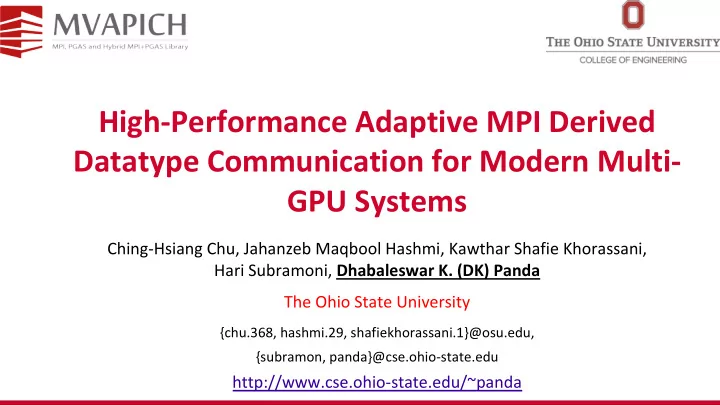

High-Performance Adaptive MPI Derived Datatype Communication for Modern Multi- GPU Systems Ching-Hsiang Chu, Jahanzeb Maqbool Hashmi, Kawthar Shafie Khorassani, Hari Subramoni, Dhabaleswar K. (DK) Panda The Ohio State University {chu.368, hashmi.29, shafiekhorassani.1}@osu.edu, {subramon, panda}@cse.ohio-state.edu http://www.cse.ohio-state.edu/~panda
Outline • Introduction • Problem Statement • Proposed Designs • Performance Evaluation • Concluding Remarks Network Based Computing Laboratory HiPC 2019 2
Drivers of Modern HPC Cluster Architectures Accelerators / Coprocessors High Performance Interconnects - high compute density, high InfiniBand SSD, NVMe-SSD, NVRAM performance/watt Multi-core Processors <1usec latency, 200Gbps Bandwidth> >1 TFlop DP on a chip • Multi-core/many-core technologies • Remote Direct Memory Access (RDMA)-enabled networking (InfiniBand and RoCE) • Solid State Drives (SSDs), Non-Volatile Random-Access Memory (NVRAM), NVMe-SSD • Multiple Accelerators (NVIDIA GPGPUs and Intel Xeon Phi) connected by PCIe/NVLink interconnects • Available on HPC Clouds, e.g., Amazon EC2, NSF Chameleon, Microsoft Azure, etc. K - Computer Summit Sierra Sunway TaihuLight Network Based Computing Laboratory HiPC 2019 3
Non-contiguous Data Transfer for HPC Applications • Wide usages of MPI derived datatype for Non-contiguous Data Transfer – Requires Low-latency and high overlap processing Quantum Chromodynamics Weather Simulation: COSMO model M. Martinasso, G. Kwasniewski, S. R. Alam, Thomas C. Schulthess, and T. Hoefler. “A PCIe congestion-aware performance model for densely populated accelerator servers. “ SC 2016 Mike Clark. “GPU Computing with QUDA, “Developer Technology Group, https://www.olcf.ornl.gov/wp-content/uploads/2013/02/Clark_M_LQCD.pdf Network Based Computing Laboratory HiPC 2019 4
State-of-the-art MPI Derived Datatype Processing • GPU kernel-based packing/unpacking [1-3] – High-throughput memory access – Leverage GPUDirect RDMA capability [1] R. Shi, X. Lu, S. Potluri, K. Hamidouche, J. Zhang and D. K. Panda, "HAND: A Hybrid Approach to Accelerate Non-contiguous Data Movement Using MPI Datatypes on GPU Clusters," ICPP 2014. [2] C. Chu, K. Hamidouche, A. Venkatesh, D. Banerjee , H. Subramoni, and D. K. Panda, Exploiting Maximal Overlap for Non-Contiguous Data Movement Processing on Modern GPU-enabled Systems, IPDPS 2016. [3] Wei Wu, George Bosilca, Rolf vandeVaart, Sylvain Jeaugey, and Jack Dongarra. “GPU-Aware Non-contiguous Data Movement In Open MPI, “ HPDC 2016. Network Based Computing Laboratory HiPC 2019 5
Expensive Packing/Unpacking Operations in GPU-Aware MPI • Significant overhead Overhead of MPI Datatype Processing 1000000 MVAPICH2-GDR: Contiguous 337X worse! when moving non- MVAPICH2-GDR: DDT 100000 OpenMPI: Contiguous contiguous GPU- OpenMPI: DDT 10000 Latency (us) resident data 1000 100 – Wasting cycles 10 – Extra data copies 1 – High Latency!!! [32,16,16] [512,512,256] [1957x245] [11797x3009] (3.28 KB) (1012 KB) (25.8 KB) (173.51KB) NAS specfem3D_cm Application Kernels and their sizes Data transfer between two NVIDIA K80 GPUs with PCIe link Network Based Computing Laboratory HiPC 2019 6
Analysis of Packing/Unpacking Operations in GPU-Aware MPI CUDA Driver Overhead Pack/unpack kernels • Primary overhead Memory Allocation CUDA Synchronization Others 100% – Packing/Unpacking 80% Time Breakdown – CPU-GPU 60% synchronization 40% – GPU driver overhead 20% 0% • Can we reduce or 1012 KB 173.51KB 1012 KB 173.51KB 3.28 KB 25.8 KB 3.28 KB 25.8 KB eliminate the expensive packing/unpacking NAS specfem3D_cm NAS specfem3D_cm MVAPICH-GDR 2.3.1 OpenMPI 4.0.1 + UCX 1.5.1 operations? Data transfer between two NVIDIA K80 GPUs with PCIe link Network Based Computing Laboratory HiPC 2019 7
Outline • Introduction • Problem Statement • Proposed Designs • Performance Evaluation • Concluding Remarks Network Based Computing Laboratory HiPC 2019 8
Problem Statement • How can we exploit load-store based remote memory access model over high- performance interconnects like PCIe and NVLink to achieve “packing-free” non- contiguous data transfers for GPU-resident data? • Can we propose new designs that mitigate the overheads of existing approaches and offer optimal performance for GPU based derived datatype transfers when packing/unpacking approaches are inevitable? • How to design an adaptive MPI communication runtime that can dynamically employ optimal DDT processing mechanisms for diverse application scenarios? Network Based Computing Laboratory HiPC 2019 9
Outline • Introduction • Problem Statement • Proposed Designs – Zero-copy non-contiguous data movement over NVLink/PCIe – One-shot packing/unpacking – Adaptive MPI derived datatype processing • Performance Evaluation • Concluding Remarks Network Based Computing Laboratory HiPC 2019 10
Overview of Zero-copy Datatype Transfer • Direct link such as PCIe/NVLink is available between two GPUs ����� ����� ��� ����������� ������������������� ����� ������� ����� ������������������������������� ��������������� ��� ������� ��� �������� • Efficient datatype layout � � ��� ������������������������������� exchange and cache ������������� ����������� ������������� • Load-store data � ��������������������������� ��� ������������������������������� ������������� ��������������������������� movement ����� ����� ��� � ������� ������� ������������������� ������ ������� ������ ������� ������� ��������������� ���� ������� ���� �������� ������� ������� ������� �������� Network Based Computing Laboratory HiPC 2019 11
Zero-copy Datatype Transfer: Enhanced Layout Cache • Convert IOV list to ������� ���������� displacement list – Improved reusability �������� ������������������ ����������������� ����������������� – One-time effort �������������� ������� �������������������� ������������������� ���������� • Cache datatype layout on �� the shared system memory ��������� ��������� ����������� ������������ ������ – Accessible within the node ���������������������� ������������������������ ������� without extra copies ������������������� ������� �� Network Based Computing Laboratory HiPC 2019 12
Zero-copy Datatype Transfer: Copy vs. Load-Store • Exploiting load-store capability of modern interconnects – Eliminate extra data copies and expensive packing/unpacking processing Existing Packing Schem Proposed Packing-free Schem Destination GPU Memory Destination GPU Memory Source GPU Memory Load-Store Source GPU Memory PCIe/NVLink PCIe/NVLink Copy Network Based Computing Laboratory HiPC 2019 13
One-shot Packing/Unpacking Mechanism • Packing/unpacking is inevitable if there is no direct link • Direct packing/unpacking between CPU and GPU memory to avoid extra copies 1. GDRCopy-based Destination GPU Memory Source GPU Memory – CPU-driven low-latency copy-based System Memory PCIe/NVLink PCIe/NVLink scheme 2. Kernel-based – GPU-driven high-throughput load- store-based scheme Network Based Computing Laboratory HiPC 2019 14
Recommend
More recommend